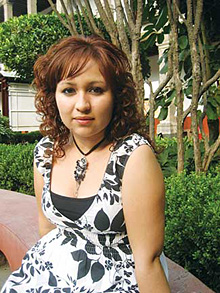
|  |  |  Travel Writers' Resources | October 2009 Travel Writers' Resources | October 2009  
Young Writer Talks Poetry in Mexico
 Maria Gallucci - The News Maria Gallucci - The News
go to original
October 09, 2009


| | Adriana Irais Dorantes (The News/Maria Gallucci) |  |
While paintings, drawings, designs and sculptures often flourish throughout Mexico City museums, galleries and bar-cafes, literature has often been the silent cousin to the city's fine arts scene.

But despite a lower profile in the public eye, Adriana Irais Dorantes assures that the poetry, narrative and short story communities are strong.

Round-table discussions, poetry readings, online forums and international contests - like the one Irais Dorantes just won - are continually hosted throughout the city to give writers the inspiration to keep working.

The 24-year-old poet said she felt invigorated to keep pursuing her poetic side after earning high-profile praise for her poetry collection "Silencio del tiempo" ("Silence of Time"). The young writer last month took home the top prize at the 2nd Bernardo Ruiz Poetry Contest, which drew more than 50 Mexican and international contestants.

The contest was sponsored by literary magazines Tinta Seca, El Uniocaso, and El universo del Búho of the Rene Aviles Fabila Foundation. Other sponsors include the Casa del Poeta Jose Revueltas, the National Fine Arts Institute (INBA) and the National Coordination of Literature.

Irais Dorantes, a recent creative writing graduate of the Universidad del Claustro de Sor Juana, sat down with The News to discuss her award-winning work and today's poetry scene in Mexico.

What inspired you in writing your poems for "Silencio del tiempo," and what does the collection talk about?

More than inspiration, I think I have some obsessions. For example, the collection's title explains much about the content of the poetry book. With time, I obsess a lot in the sense that it is not something you can measure, even though we say when do; time also includes what is remembrance and memory. I also include a lot of references to silence.sometimes we want all the words, but we realize that the more that we look to find them, they're not sufficient to express what we want. So, we remain in silence. The collection also talks about loneliness and the absence of someone that you love.

I have always written, but I've just recently learned the poetic form; the rhetorical figure, how to use language, rhythm.things that make poetry. I try to express what I have inside, so that it doesn't just stay there and that the rest of the world can know it. If you're a writer, the things that you write aren't just for you, they're for others who can appropriate what you've said. It's very transcendental.

My poetry book is pretty small, but I'm working on a bigger collection separated by chapters. The fact that I've won this contest is a kind of incentive to keep going. Some people say that you can't live off writing, but there are poets who do. I know people who live off their writing and they're doing well.

What is today's poetry scene like in Mexico?

In school, they'll give you Homer up to the 20th century, but it's more interesting to go to round-tables, poetry readings, talks with people who are publishing now - to not just read the canonical, but to see what is going on right now.

There are many people [on the scene], but sometimes they're hard to find, because there isn't much cultural diffusion for new poets. But if you go looking, you will find them. I've gone to book presentations where only a few people came, but it's a start. You have to fight if you want to be published, if you want a space in a magazine. You can achieve it, but you have to work at it first.

Magazines like Alforja and El Perro are dedicated just to poetry, but there are also many literature magazines that will make a space for poetry. Lenguara, for example, or La Jornada de Aguascalientes. They're giving opportunities for new poets to submit their work.

Some good places to hear or talk about literature are the poetry series at Palacio de Bellas Artes [in the Centro Histórico]; the Casa del Poeta; and the Centro de Lectura Condesa [in the central neighborhood of the same name].

How has the Internet influenced local poets and their work?

The Internet can be a very powerful weapon, because today so many people have blogs; you can post your work on a blog, and if someone who sees it likes it, you can get in touch that way. In Facebook, you can post a link, and there are many more chances that people will see your work.

It also helps so that you're not solely fighting to be published or to enter closed circles. It's important to use technology and these new tools that help to advance poetry and literature.

Read Adriana's blog at www.delailusionalcaos.blogspot.com |

 |
|  |



